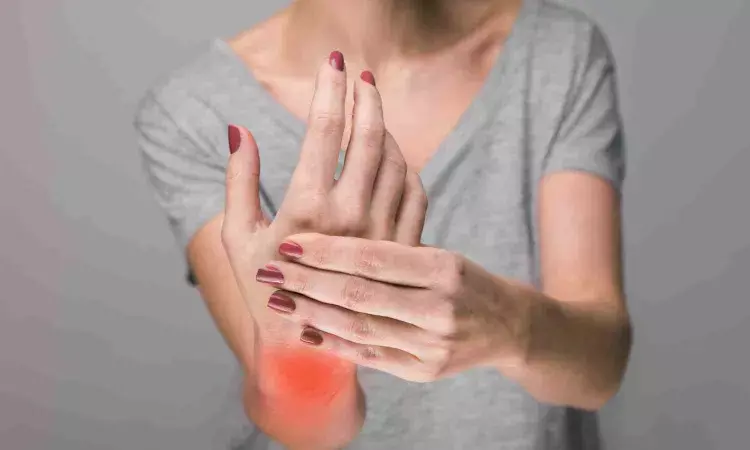- Home
- Medical news & Guidelines
- Anesthesiology
- Cardiology and CTVS
- Critical Care
- Dentistry
- Dermatology
- Diabetes and Endocrinology
- ENT
- Gastroenterology
- Medicine
- Nephrology
- Neurology
- Obstretics-Gynaecology
- Oncology
- Ophthalmology
- Orthopaedics
- Pediatrics-Neonatology
- Psychiatry
- Pulmonology
- Radiology
- Surgery
- Urology
- Laboratory Medicine
- Diet
- Nursing
- Paramedical
- Physiotherapy
- Health news
- Fact Check
- Bone Health Fact Check
- Brain Health Fact Check
- Cancer Related Fact Check
- Child Care Fact Check
- Dental and oral health fact check
- Diabetes and metabolic health fact check
- Diet and Nutrition Fact Check
- Eye and ENT Care Fact Check
- Fitness fact check
- Gut health fact check
- Heart health fact check
- Kidney health fact check
- Medical education fact check
- Men's health fact check
- Respiratory fact check
- Skin and hair care fact check
- Vaccine and Immunization fact check
- Women's health fact check
- AYUSH
- State News
- Andaman and Nicobar Islands
- Andhra Pradesh
- Arunachal Pradesh
- Assam
- Bihar
- Chandigarh
- Chattisgarh
- Dadra and Nagar Haveli
- Daman and Diu
- Delhi
- Goa
- Gujarat
- Haryana
- Himachal Pradesh
- Jammu & Kashmir
- Jharkhand
- Karnataka
- Kerala
- Ladakh
- Lakshadweep
- Madhya Pradesh
- Maharashtra
- Manipur
- Meghalaya
- Mizoram
- Nagaland
- Odisha
- Puducherry
- Punjab
- Rajasthan
- Sikkim
- Tamil Nadu
- Telangana
- Tripura
- Uttar Pradesh
- Uttrakhand
- West Bengal
- Medical Education
- Industry
Rheumatoid Arthritis Linked to Higher Risk of Kidney Stones, NHANES Study Finds

China: A new study published in Arthritis Research & Therapy has found that adults living with rheumatoid arthritis (RA) are significantly more likely to develop kidney stones (KS) than those without the condition. Conducted by Dr. Yongda Liu and colleagues from the Department of Urology at The First Affiliated Hospital of Guangzhou Medical University, China, the research sheds light on a potential but previously underexplored link between these two common health issues.
The researchers analyzed data from the U.S. National Health and Nutrition Examination Survey (NHANES) spanning 2007 to 2020. The study included 19,904 adults aged 20 years and older, among whom 1,477 self-reported having RA through validated survey tools. Diagnoses of kidney stones were also self-reported.
Using weighted logistic regression models, the study examined whether having RA was independently associated with an increased likelihood of developing kidney stones. The analysis accounted for a comprehensive list of variables, including demographic factors (age, sex, race, education, income, marital status), lifestyle factors (smoking, alcohol consumption, physical activity), and clinical parameters such as body mass index, diabetes, hypertension, kidney function markers, cholesterol levels, and serum uric acid.
The key findings of the study were as follows:
- The prevalence of kidney stones was significantly higher in individuals with rheumatoid arthritis (RA) at 17.0%, compared to 8.1% in those without RA.
- After adjusting for various demographic, clinical, and lifestyle factors, RA was associated with a 77% higher likelihood of developing kidney stones (OR = 1.77).
- The positive association between RA and kidney stones remained consistent across all subgroup analyses, suggesting the elevated risk was independent of other influencing factors.
While the exact biological mechanisms behind this association remain unclear, the study opens new avenues for further investigation. Chronic inflammation, alterations in immune function, and metabolic imbalances in RA patients may potentially contribute to stone formation, but more research is needed to clarify these pathways.
Despite the compelling findings, the authors caution against drawing definitive conclusions about causality due to the cross-sectional design of the study. “Although our results demonstrate a strong association between RA and kidney stone prevalence, longitudinal and interventional studies are necessary to establish a causal relationship and explore the underlying mechanisms,” the authors noted.
The research highlights the importance of heightened clinical awareness. Physicians managing RA patients may consider screening for kidney stone risk, especially in those presenting with relevant symptoms or metabolic abnormalities.
"The study highlights a significant association between rheumatoid arthritis and kidney stones in U.S. adults. While further research is needed to confirm causality, the findings suggest that individuals with RA may benefit from proactive monitoring for kidney stone risk as part of their overall care," the authors concluded.
Reference:
Yue, G., Yan, Y., Zeng, X. et al. Association between rheumatoid arthritis and kidney stones: A cross-sectional study of NHANES 2007–2020. Arthritis Res Ther 27, 141 (2025). https://doi.org/10.1186/s13075-025-03604-w
Dr Kamal Kant Kohli-MBBS, DTCD- a chest specialist with more than 30 years of practice and a flair for writing clinical articles, Dr Kamal Kant Kohli joined Medical Dialogues as a Chief Editor of Medical News. Besides writing articles, as an editor, he proofreads and verifies all the medical content published on Medical Dialogues including those coming from journals, studies,medical conferences,guidelines etc. Email: drkohli@medicaldialogues.in. Contact no. 011-43720751


